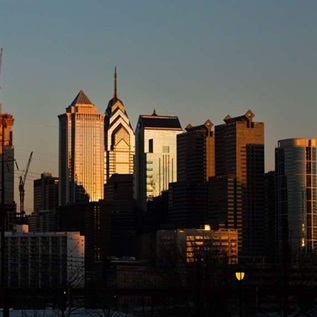Pew Survey Finds Philadelphians Oppose Mayor's Proposals to Raise Taxes to Close the City's Budget Gap
Philadelphians generally oppose raising taxes, particularly the property tax, to help address the city's projected $1.4 billion budget gap over the next five years, according to a new Pew poll.
Mayor Michael Nutter's proposal to increase the property tax over the next two years is rejected by 86 percent of the respondents in a survey of 800 city residents, commissioned by The Pew Charitable Trusts' Philadelphia Research Initiative.
Negative feelings about his proposal to raise the sales tax by one percentage point for three years are not as strong, although a majority (53 percent) is against it. And 68 percent oppose raising the city's wage tax, an alternative being explored by some members of City Council.
The survey was conducted by Abt SRBI Public Affairs in association with Rutgers Professor Cliff Zukin.
Residents also appear to be unhappy with the overall approach of Mayor Nutter's budget, which he delivered to Council on March 19.
In the poll, respondents were asked to choose between two general approaches to the current budget situation: one was maintaining government services while raising taxes; the other was getting fewer services while keeping taxes at current levels. Forty-eight percent chose the fewer services/same taxes option, while 35 percent opted for the same services and higher taxes. Mayor Nutter's plan aims to maintain core city services while raising taxes for the next few years.
At the same time, Philadelphians give city officials little guidance about how the budget should be balanced. Fewer services would mean fewer city workers, but 62 percent oppose even a 1 percent cut in the city workforce.
“The poll indicates that people don't want to make the tough choices—they want their leaders to make the choices for them,” says Larry Eichel, project director of the Philadelphia Research Initiative.
Those polled were also asked whether they thought the proposed increases in the sales and property taxes— which come with three-year and two-year limits, respectively—would actually disappear on schedule should those taxes be enacted. Sixty-nine percent say they expect those increases to become permanent, while 22 percent expect them to be temporary.
In a separate question, residents were asked to assume that some tax increases would be necessary to balance the budget and to offer their opinions about raising taxes on businesses, sales, wages and/or property. There is a small majority (51 percent) for higher business taxes—an option neither the mayor nor City Council appears to be considering—and less support (45 percent) for a higher sales tax. Support for hiking the wage tax is small (25 percent), and support for raising the property tax is even smaller (14 percent).
The resistance to tax increases is not accompanied by a broad consensus over how to reduce labor costs through the budget process and in upcoming negotiations with the municipal labor unions. By 52 percent to 41 percent, Philadelphians oppose Nutter's call to make city workers pay more for their health benefits. But they do favor, by 53 percent to 36 percent, his proposal to make city workers contribute more to their pension plans.
Nutter remains popular with Philadelphians, although his popularity has declined since a Philadelphia Research Initiative poll taken in January. City residents, even with all of their misgivings about his tax proposals, say they have more confidence in the mayor to handle the budget situation than they do in members of City Council.
Nutter gets favorable ratings from 59 percent of respondents and unfavorable ratings from 33 percent, a net decline in favorability of 12 percentage points from January. This time, as before, he is far more popular among whites (73 percent) than among blacks (46 percent).
By a margin of 50 percent to 45 percent, also down from January, residents say they have confidence in Nutter's ability to handle the budget situation. By contrast, 39 percent say they are confident of City Council's ability to handle the budget, while 52 percent say they are not.
One of the highlights of the Philadelphia Research Initiative's January poll, taken in the days prior to the inauguration of President Obama, was the optimism expressed by Philadelphians in the face of hard economic times. On that score, there has been some retrenchment. By a margin of 47 percent to 34 percent, residents now believe that the city is on the “wrong track” and not headed in the “right direction.” Three months ago, those perceptions were flipped, with 46 percent saying the city was moving in the right direction and 37 percent saying it was on the wrong track.
About the Survey
The Philadelphia Research Initiative survey was conducted by telephone between April 6 and April 11, 2009, among a citywide random sample of 800 city residents, ages 18 and older. The final sample was weighted to reflect the demographic breakdown of the city. The margin of error for the entire sample is approximately +/- 3.5 percentage points. The margin of error is higher for subgroups. Surveys are subject to other error sources as well, including sampling coverage error, recording error and respondent error.
Abt SRBI Public Affairs designed the survey and conducted all interviewing, working with Cliff Zukin, veteran pollster and director of the public policy program at Rutgers University.
About The Philadelphia Research Initiative
The Philadelphia Research Initiative (www.pewtrusts.org/philaresearch) is a new unit created by Pew in fall 2008 to study critical issues facing Philadelphia and provide impartial research and analysis for the benefit of decision makers, the news media and the public. The initiative conducts public opinion polling, produces in-depth reports, and publishes briefs that illuminate front-and-center issues.






